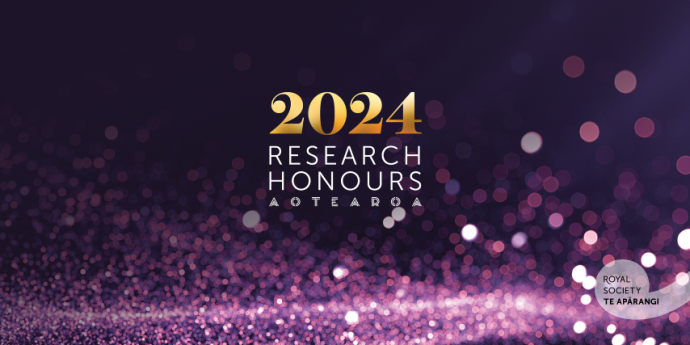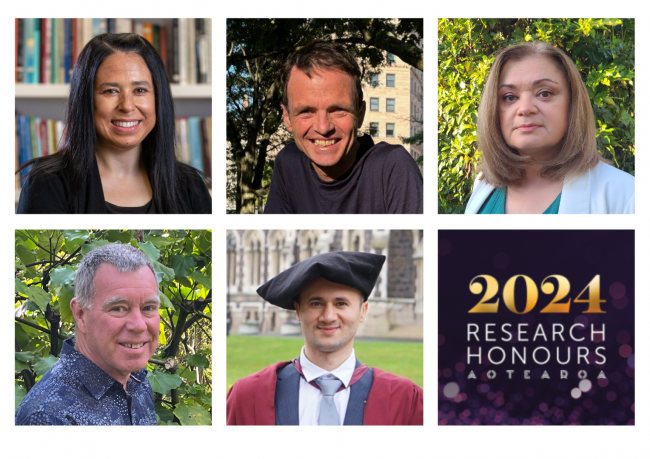News
Published 14 November 20242024 Research Honours Aotearoa: first event

Five medals and awards were presented in Ōtepoti Dunedin this evening by the Royal Society Te Apārangi to recognise researchers who have achieved excellence in scholarship or innovation or who have made a significant contribution to Aotearoa New Zealand through their research careers.
Tonight’s winners are recognised for inclusive science communication, the mathematics behind evolutionary trees, understanding perceptions of the European Union and Ukraine in public diplomacy, sharing the rich botany of Aotearoa, and the physics of phase transitions.
This was the first of three 2024 Research Honours Aotearoa events to be held around the country, with events coming up in Tāmaki Makaurau Auckland on 20 November and Te Whanganui-a-Tara Wellington on 28 November.
President of the Society, Distinguished Professor Dame Jane Harding DNZM MBChB DPhil FRACP FRSNZ said the Society has a vision for an Aotearoa New Zealand that is guided and inspired by science and research, and an ambitious long-term strategy to achieve that goal. “The Research Honours Aotearoa form a very important part of the Society’s mandate to encourage, promote, and recognise excellence in science, technology, and the humanities.
“This year’s winners include leaders who have advanced the frontiers of knowledge across a broad range of disciplines, and worked tirelessly to share their expertise.
“We also celebrate bright new talents who are making innovative contributions to their fields, and who fill me with hope about the future of our country.
“Importantly we acknowledge all those who have supported our winners to achieve excellence — their whānau and friends as well as colleagues at their research institutions."

RESPECTFUL AND INCLUSIVE SCIENCE COMMUNICATION AND ENGAGEMENT
Associate Professor Dianne Sika-Paotonu has been awarded the Callaghan Medal for her evidence-based science communication and engagement efforts for Aotearoa New Zealand and the Pacific region.
A biomedical scientist with expertise in immunology, Dianne is an Associate Professor of Biomedical & Health Sciences and Associate Dean at Ōtākou Whakaihu Waka the University of Otago, Wellington. Her research is centred on cancer, rheumatic fever and rheumatic heart disease, heart health and infectious diseases for vulnerable communities.
Dianne has demonstrated effective evidence-based communication with other researchers, students, and the general public, adapting her content and style to what is most useful and important for each audience. An advocate for two-way communication and involving the community with her research projects, she is helping to reduce health inequities, for example in work to reduce the high rates of rheumatic fever for Māori and Pasifika. Dianne was a leading voice during the Covid-19 pandemic, when her expertise, empathy and engaging manner made her a highly effective communicator.
Read more about 2024 Callaghan Medal winner.
THE MATHEMATICS BEHIND EVOLUTIONARY TREES AND NETWORKS
Distinguished Professor Charles Semple FRSNZ, of Te Whare Wananga Waitaha University of Canterbury, has been awarded the Hector Medal for ground-breaking mathematical research in phylogenetics and matroid theory.
Phylogenetics is the study of evolutionary trees and networks based on inherited characteristics. Charles has made major contributions to mapping traits outside the way they are typically inherited from parents, such as hybridisation and lateral gene transfer.
For matroid theory, which is a form of pure mathematics related to geometric structures, he has developed essential tools and technical breakthroughs to advance this field. Matroids are important for optimisation problems, and applications extend to electrical engineering and coding theory.
Read more about the 2024 Hector Medal winner.
A LEADING VOICE ON INTERNATIONAL RELATIONS
Professor Natalia Chaban, of Te Whare Wananga Waitaha University of Canterbury, has been awarded the Mason Durie Medal for her innovative research into perceptions in international relations and public diplomacy, most recently focusing on the war in Ukraine.
For over two decades, Natalia’s research has focused on the cognitive and semiotic aspects of political and media discourses, public diplomacy and political communication within the European Union and internationally. Her research investigates the effects of mental images and perceptions of international partners and rivals. This research has united scholars, diplomats and students from around the world into collaborative research networks that have informed policy.
Read more about the 2024 Mason Durie Medal winner.
SPEAKING FOR THE TREES (AND OTHER BOTANICAL WONDERS)
Dr Peter Heenan, Manaaki Whenua, has been awarded the Leonard Cockayne Lecture Award, which commemorates the life and work of a great New Zealand botanist. Peter has had a decades-long commitment to Aotearoa’s rich botany and has shared his knowledge with audiences across Aotearoa New Zealand and the world.
Peter has been described as having an unrivalled knowledge of Aotearoa New Zealand’s flora and the institutions responsible for botanical research. He began as a horticulturist and eventually became Director of Manaaki Whenua’s Allan Herbarium.
Read more about the latest Leonard Cockayne Lecture Award winner.
PIONEERING UNDERSTANDING OF PHASE TRANSITIONS IN DISORDERED SYSTEMS
Dr Ehsan Arabahmadi, of Ōtākou Whakaihu Waka University of Otago, has been awarded the Hatherton Award for the best paper in physical, earth, mathematics or information sciences by a PhD student, for his paper published in the Journal of the American Physical Society on phase transition in disordered systems.
A phase transition is the physical process in which a medium changes from one form to another – like ice melting to water. These transitions are fundamental to understanding the physical world. Disorder, including impurities and defects, play a crucial role in the conductivity of metals and insulators – but there are unanswered questions in this field, particularly about how planar-sheet-like (two-dimensional) systems work.
In his paper, ‘Momentum-space signatures of the Anderson transition in a symplectic, two-dimensional, disordered ultracold gas’, Ehsan addressed some of these crucial questions and identified ways to further investigate them using theoretical and experimental techniques.
Read more about the 2024 Hatherton Award winner.
